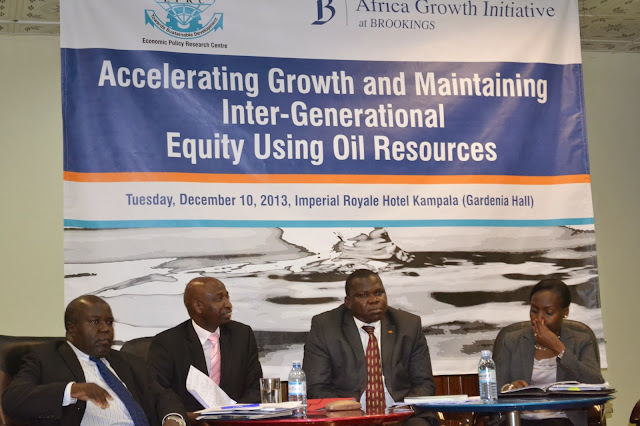EPRC raises the level of oil discussions in Uganda
By Esther Nakkazi
Ministry of Energy and Mineral Development officials have commended the Economic Policy Research Centre (EPRC) for the research on oil for intergenerational equity. They say EPRC researchers have raised the level of discussion in the oil and gas sector taking adequate stock of what has been done and giving a positive look at what will happen.
The research is in a published paper entitled ‘Accelerating Growth and maintaining Intergenerational Equity using oil resources in Uganda,’ presented in Kampala on 10th December 2013 by Lawrence Bategeka, a senior Research Fellow at EPRC and Joseph Mawejje a Research Analyst at EPRC.
The paper suggests things Uganda should do right to avoid the natural resource curse and to ensure that the benefits from oil accrue equally to the current as well as future generations.
“It is good to have the academicians and researchers talking about oil. The country can now have an engagement between the people who know and people who do,” said Ernest Rubondo, the commissioner for Petroleum Exploration and Production Department (PEPD) at the Ministry of Energy.
“We have only walked the journey of exploration and this has been done well.”
The paper focuses on three issues: resource, oil revenue and environmental management. It explains the legal and regulatory framework - the National Oil and Gas Policy, which proposed three key institutions; Directorate of Petroleum in Ministry of Energy to provide monitoring and policy direction, The Petroleum Authority – as regulator of the sector; and the National Oil Company – to manage the commercial aspects of the petroleum activities on behalf of the state.
Rubondo says the paper by EPRC researchers is an improvement of the discussion about oil in Uganda. “The arguments are better, it is readable and since oil is becoming a big animal, all of us should participate,” said Rubondo.
He corrected the impression about Uganda oil licensing moratorium and said it was an effective licensing strategy –taken since 2007- and it is a disciplined decision as Uganda had to first of all put the necessary legal framework in place. ‘This effort also provides for intergenerational equity.’
Ronald Kaggwa the director Policy, Planning and Information at the National Environment Management Authority (NEMA) said the report is tilted more to the economic side and less on the environment.
While Bategeka said NEMA lacks capacity with only 13 of the 38 staff required to do a good job, Kaggwa said NEMA is not the only manager of the environment in Uganda. He also said he was disappointed that the paper does not talk about what has been done in terms of readiness to the environment and concentrates so much on conservation ignoring other areas.
He emphasized that all projects implemented in the Albertine Graben undergo an Environmental Impact Assessment (EIA) by NEMA, which does not necessarily always approve applications as was alledged.
“Investment in the ecological infrastructure is a public good we need to invest in. There are risks but the returns are high and it is the best way to achieve rural development,” said Kaggwa.
Ms. Pamela Natamba a senior manager at Pricewaterhousecoppers (PwC) said management of oil resources needs a delicate balance. She said the paper was clear with goals of different actors well spelt out but even if the revenue management policy had been well written nothing was said about its implementation.
Member of Parliament for Buliisa Stephen Biraahwa Mukitale suggested that Uganda should not keep its oil money in a dollarized account because it will finance foreign economies and said he supports a single account for oil revenues.
Interesting, he also suggested that ‘Uganda should use oil money in creating a national airline?’ and that more investment should be put into knowing what Uganda has in other sectors. “If you know what you have then you are at the stronger side and can negotiate better. I suggest that government should give money to the have-nots,” said Biraahwa.
He also wanted to know about the development plan and suggested that there should be a road map, coasted with time lines because that is ‘what business is’. Oil is about leadership and it is about a balancing-act, said Biraahwa.
Currently, the debate on oil in Uganda is about front loading funds in form of a big push, a Marshall plan to fix the infrastructure. IMF says they are limiting Uganda’s front loading to $1.5 million commercial borrowing and the World Bank says Uganda should just get concessional money.
More issues were raised during the discussion about why Uganda should build a pipeline, which will be useless when oil that will only last for 30 years is finished. Why not build a railway? Meanwhile, Rwanda is already negotiating with Uganda on prospects of the pipeline.
Some participants asked why we should not front-load development. Why not front load and we finish the infrastructure problem? Clarity on the forecast of how much money is expected from oil during its production life -$10 billion, $50 billion, over $250 billion was also raised.
Ivan Mugabi from NAPE was sure that since oil waste is accumulating, Uganda is already in the production stage. “Waste is accumulating to levels that suggest production,” said Mugabi.
But Rubondo assured that oil waste is produced at every stage of oil production. For instance at the exploration stage now there is already waste or cuttings.
Rubondo said the research focuses on specific aspects but it should focus on other aspects too so that these are not seen in isolation. He also said some of the recommendations made the researchers have already been put in the oil policy.



Comments
Post a Comment